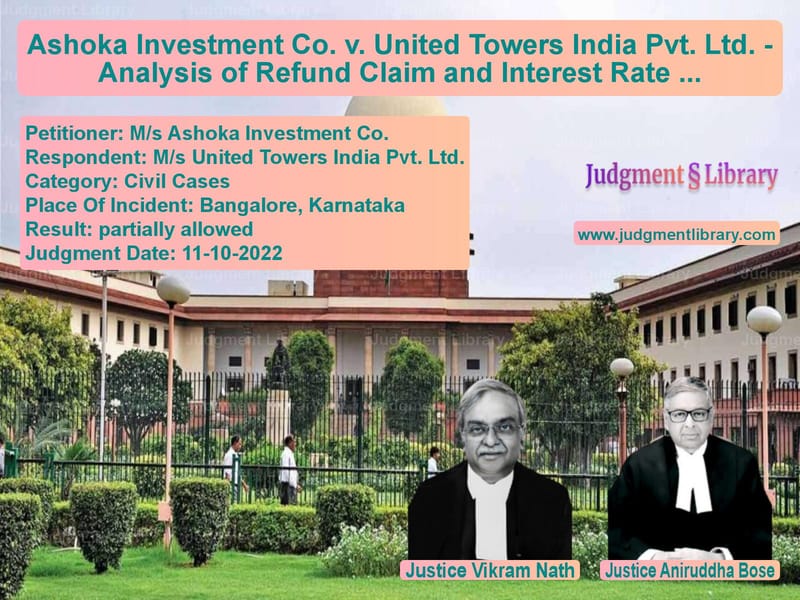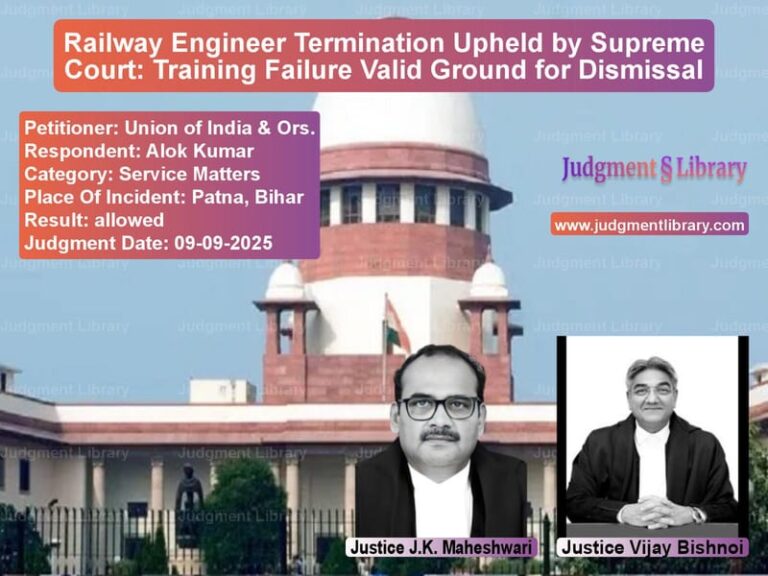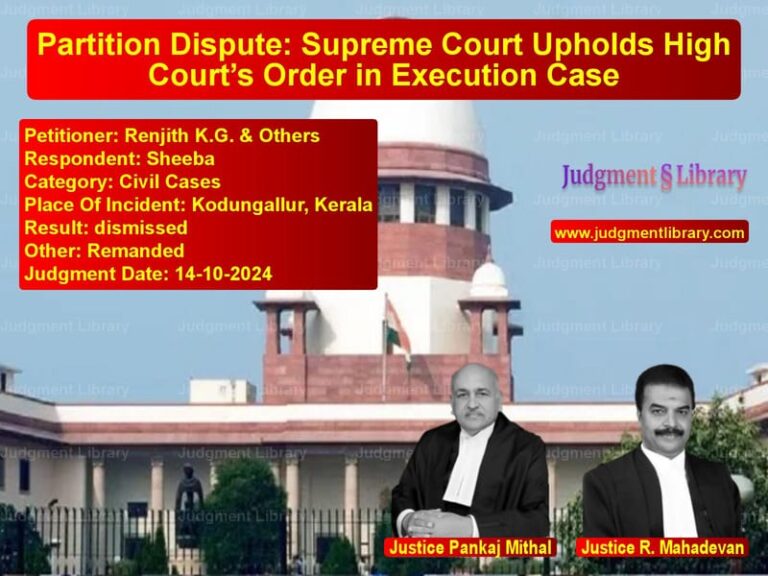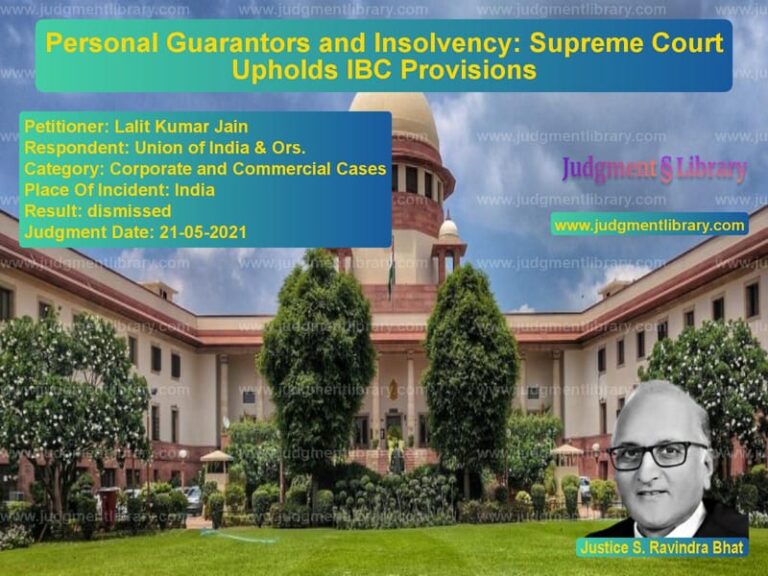Ashoka Investment Co. v. United Towers India Pvt. Ltd. – Analysis of Refund Claim and Interest Rate in Consumer Disputes
The case revolves around a dispute between M/s Ashoka Investment Co. (the appellant) and M/s United Towers India Pvt. Ltd. (the respondent) concerning the non-delivery of two flats in the Krishna Apartments, Bangalore. The appellant had paid Rs. 4,95,000 for the flats, but despite several years passing after the payment, possession was never handed over. In 1999, the appellant discovered that the flats had been transferred to third parties. The appellant sought to claim a refund with interest, raising the issue before the National Consumer Disputes Redressal Commission (NCDRC). The NCDRC ruled in favor of the appellant, ordering the respondent to refund the amount along with interest at 9% per annum from 17.01.1995, which the appellant found inadequate, leading to this appeal.
The core issue here is whether the interest rate awarded by the NCDRC should be increased to 18% per annum, as per the agreement between the parties. The appellant also seeks a higher compensation and the handing over of possession of the flats, or alternatively, a higher refund amount considering the delay in delivery and the transfer of the flats to third parties.
Petitioner and Respondent Arguments
Petitioner’s Arguments:
- The appellant’s counsel argued that the respondent had failed to deliver possession of the flats and had unjustly transferred the flats to third parties in 1995, without any valid communication to the appellant. The appellant pointed out that Rs. 1,00,000 was paid as an advance in 1980 for each flat, and the entire amount of Rs. 4,95,000 was paid soon after. Despite the appellant fulfilling all obligations under the agreement, the flats were never handed over, leading to significant delay and inconvenience. The appellant contended that the rate of interest awarded by the NCDRC (9%) was too low and did not reflect the actual financial loss incurred by the appellant, given the delay and breach of agreement.
- The appellant further emphasized that according to the agreement, in case of default, interest could be charged at 18% per annum, and hence it was only fair that the same interest rate be applied to the refund amount.
Respondent’s Arguments:
- The respondent, M/s United Towers India Pvt. Ltd., argued that the appellant had not raised the issue of the flats’ possession in a timely manner and had allowed considerable delay before approaching the authorities. The respondent claimed that the cancellation and transfer of the flats were carried out due to the appellant’s delay in completing the formalities and paying the required installments. The respondent denied the allegations of unjust transfer to third parties and argued that the NCDRC’s decision to award 9% interest was fair, given that the delay in possession was not entirely the fault of the respondent.
- The respondent further contended that the appellant had agreed to certain terms and conditions under which the transaction was conducted, including the interest rate, and that the NCDRC’s award was in line with these terms. The respondent claimed that the interest rate should not be increased as the amount already refunded by the respondent reflected the fair compensation for the delay in delivery.
Key Issues and Supreme Court’s Ruling
The Supreme Court addressed several key issues in this case:
1. Validity of the Refund and Interest Rate
The primary issue was whether the NCDRC’s decision to award 9% interest was appropriate, considering the facts of the case and the terms of the agreement between the parties. The Supreme Court examined the agreement and noted that the contract allowed for a higher interest rate of 18% per annum in the event of default. The Court observed that the respondent had unjustly enriched itself by transferring the flats to third parties while failing to deliver possession to the appellant, and that the appellant had suffered financial loss as a result of the delay.
The Court agreed with the appellant’s argument that the interest rate of 9% was insufficient and increased the interest rate to 18% per annum, as per the contractual terms. The Court also emphasized that such an award would provide just compensation for the delay caused by the respondent’s actions.
2. Transfer of Flats to Third Parties
The Court addressed the issue of the respondent’s transfer of the flats to third parties without the appellant’s consent. The appellant had raised concerns that the flats were transferred after the respondent had failed to fulfill its obligations under the agreement. The Court noted that the transfer of the flats to third parties was a breach of the agreement and that the appellant should have been entitled to possession or, at the very least, proper compensation for the loss of the flats. The Court directed that the respondent refund the amount paid by the appellant along with the enhanced interest.
3. Compensation for Delay and Breach of Agreement
The Supreme Court concluded that the delay and breach of the agreement by the respondent warranted an enhanced refund amount with higher interest. The Court observed that the appellant had been patient for several years and had paid the full sale consideration without receiving possession. The Court also pointed out that the respondent’s failure to hand over possession and the unjust transfer of the flats to third parties was a clear violation of the terms of the agreement. The Court found that the NCDRC’s decision was insufficient in compensating the appellant for the financial loss suffered due to the delay, and thus increased the compensation.
Conclusion
The Supreme Court allowed the appeal and modified the NCDRC’s order. The Court directed the respondent to refund Rs. 4,95,000 along with interest at the rate of 18% per annum, effective from 17.01.1995, until the amount was paid in full. The Court emphasized that the enhanced interest rate and refund amount were necessary to adequately compensate the appellant for the undue delay, breach of agreement, and unjust transfer of the flats to third parties. The respondent was also ordered to pay the refund amount within four weeks from the date of the judgment.
This decision underscores the importance of adhering to contractual obligations and provides clarity on how compensation should be calculated in cases involving delayed possession and breaches in real estate agreements.
Impact and Implications
The ruling will have a significant impact on the real estate sector, particularly in cases involving delayed possession and breach of contract. It highlights the need for developers and builders to honor their agreements and the importance of compensating homebuyers fairly for delays. The decision also clarifies the application of interest rates in real estate contracts and sets a precedent for similar cases where possession is delayed or property is transferred to third parties without consent.
Petitioner Name: M/s Ashoka Investment Co..Respondent Name: M/s United Towers India Pvt. Ltd..Judgment By: Justice Vikram Nath, Justice Aniruddha Bose.Place Of Incident: Bangalore, Karnataka.Judgment Date: 11-10-2022.
Don’t miss out on the full details! Download the complete judgment in PDF format below and gain valuable insights instantly!
Download Judgment: ms-ashoka-investmen-vs-ms-united-towers-in-supreme-court-of-india-judgment-dated-11-10-2022.pdf
Directly Download Judgment: Directly download this Judgment
See all petitions in Contract Disputes
See all petitions in Property Disputes
See all petitions in Damages and Compensation
See all petitions in Environmental Cases
See all petitions in Judgment by Vikram Nath
See all petitions in Judgment by Aniruddha Bose
See all petitions in partially allowed
See all petitions in supreme court of India judgments October 2022
See all petitions in 2022 judgments
See all posts in Civil Cases Category
See all allowed petitions in Civil Cases Category
See all Dismissed petitions in Civil Cases Category
See all partially allowed petitions in Civil Cases Category







